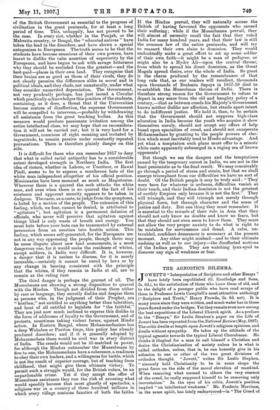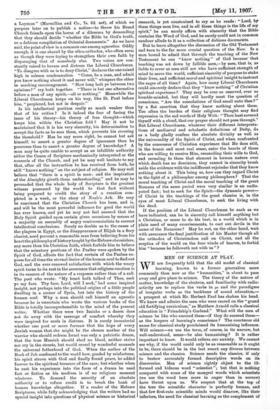THE AGNOSTIC'S DILEMMA.
JOWETT'S "Interpretation of Scripture and other Essays 7 have lately been republished (G. Itoutledge and Sons, 2s. 6d.), to the satisfaction of those who knew them of old, and to the delight of a younger public who have read scraps of them in Professor Lewis Campbell's most attractive anthology (" Scripture and Truth," Henry Frowde, 2s. 6d. net). It is many years since they were written, and much water has in those years flowed under the bridges. Yet they remain even now among the best expositions of the Liberal Church spirit. As a preface to the "Essays," Sir Leslie Stephen's paper on the Life of Jowelt has been reprinted from the National Review (May,1897). The critic dwells at length upon Jowett's religious opinions, and dwells without sympathy. He takes up the attitude of the typical agnostic towards the typical Liberal Churchman. He thinks it illogical for a man to call himself a Christian and desire the Christianisation of society unless he is what is called orthodox, unless, that is, he can honestly give in his adhesion to one or other of the two great divisions of orthodox thought. " Jewett," writes Sir Leslie Stephen, " sincerely held Christianity to be in some shape the great force on the side of the moral elevation of mankind. When removing what seemed to others the very essence of the creed, he really supposed himself to be removing only incrustation." In the eyes of his critic, Jowett's position implied"an intellectual weakness." Mr. Frederic Harrison, in the sense spirit, has lately endeavoured—in " The Creed of
a Layman" (Macmillan and Co., 7s. 6d. net), of which we purpose later on to publish a notice—to throw his Broad Church friends upon the horns of a dilemma by demanding that they should decide" whether the Bible be God's truth, or a dubious compilation of Oriental documents." As we have said, the point of view is a common one among agnostics. Oddly enough, it is one shared by the ultra-oithodox, who often seem as though they were trying to strengthen their own faith by disparaging that of somebody else. Two voices are con- stantly raised to harass and distress the Liberal Churchman. "To disagree with us is to deny Christ," declares the one raised high in solemn condemnation. "Come, be a man, and admit you know nothing about it and never will," whispers the other in mocking encouragement. "How long halt ye between two opinions ? " cry both together. "There is but one alternative before a man of any spirit,—all or nothing." Meanwhile the Liberal Churchman keeps on his way, like St. Paul before him, "perplexed, but not in despair."
Is his intellectual position really so much weaker than that of his critics ? Is it indeed the fear of facing the issue of his theory—his theory of free thought—which keeps him within the Christian fold ? May it not be maintained that it is his very sincerity, his determination to accept the facts as he sees them, which prevents his crossing the threshold ? Has be any more right, he cannot but ask himself, to assert a greater degree of ignorance than he possesses than to assert a greater degree of knowledge ? A man may be quite unable to accept as an infallible authority either the Canon of Scripture mechanically interpreted or the counsels of the Church, and yet he may well hesitate to say that, after all the instruction he has received from both, he still "knows nothing" on the subject of religion. He may well believe that "there is a spirit in man: and the inspiration of the Almighty giveth them understanding," and be may be persuaded that the whole body of Scripture is the greatest witness possessed by the world to that fact without being prepared to credit the story of a creation com- pleted in a week, or the story of Noah's Ark. He may be convinced that the Christian Church has been, and is, and will be the moat powerful influence for good the world has ever known, and yet he may not feel assured that the Holy Spirit guided upon certain given occasions by means of a majority an assembly of angry controversialists to correct intellectual conclusions. Surely no doubts as to the cause of the plagues in Egypt, or the disappearance of Elijah in a fiery chariot, need prevent a reasonable man from believing from his heart the philosophy of history taught by the HebrewehronMlers, any more than his Christian faith, which forbids him to believe that the minatory portions of the Psalter were spoken by the Spirit of God, affects the fact that certain of the Psalms ex- press for all time the eternal desire of the human soul to find out God, and the ever-renewed satisfaction with which the weary spirit turns to its rest in the assurance that religious emotion is in its essence of the nature of a response rather than of a call. The poet who wrote: "My heart bath talked of Thee, seek ye my face. Thy face, Lord, will I seek," had some inspired insight, not perhaps into the political origins of a little people dwelling in a corner of Syria, but into the history of the human soul. Why a man should call himself an agnostic because he is uncertain who wrote the various books of the Bible is totally incomprehensible to the mind of the present writer. Whether there were two Isaiahs or a dozen does not do away with the message of comfort whereby they were inspired for souls in distress. It is surely immaterial whether one poet or more foresaw that the hope of every Jewish woman that she might be the chosen mother of the warrior who should redeem Israel was only a patriotic dream, that the true Messiah should shed no blood, neither strive nor cry in the streets, but would reveal by wonderful counsels the universal fatherhood of God. When the author of the Book of Job confessed to the world how, goaded by misfortune, his spirit strove with God and finally found peace, he added forever to the spiritual treasure of the race; but whether when he cast his experience into the form of a drama he used fact or fiction as his medium is of no religious moment whatever. To demand the security of an absolute authority or to refuse credit is to break the bank of human knowledge altogether. If a reader of the Hebrew Scriptures, while fully acknowledging that the writers had no Special insight into questions of physical science or 'historical
research, is yet constrained to cry as he reads : " Lord, by these things men live, and in all these things is the life of my spirit," he can surely affirm with sincerity that the' Bible contains the Word of God, and he surely could not in common candour allude to it as a collection of dubious documents.
But to leave altogether the discussion of the Old Testament and turn to the far more crucial question of the New. is a man bound to admit that through the teaching of the New Testament be can "know nothing " of God because' that teaching was set down by fallible men,—by men, that is, as liable to error as men still are who have sufficient strength of mind to move the world, sufficient sincerity of purpose to stake their lives, and sufficient moral and spiritual insight to instruct the sages of all time P Again, how many Liberal Churchmen could sincerely declare that they "know nothing" of Christian spiritual experience ? They may be ever so reserved, ever so humble-minded, but they will hardly meet the question of conscience, "Are the consolations of God small unto thee ? " by a fiat assertion that they know nothing about them. Too often the burden of their religious thought may find expression in the sad words of Holy Writ : " Thou halt covered thyself with a cloud, that our prayer should not pass through." But Liberal Churchmen, whatever their different interpreta- tions of mediaeval and scholastic definitions of Deity, do as a body gladly confess the absolute divinity as well as the universality of the Spirit of Christ, and when confronted by the consensus of Christian experience that He does still; in the truest and most real sense, enter the hearts of those who are willing to receive Him, reconciling their wills to God, and revealing to them that element in human nature over which death has no dominion, they cannot in sincerity brush aside the evidence with the indifferent rejoinder that they know nothing about it. This being so, how can they regard Christ in the light of a philosopher among philosophers P That the moral teaching of Christ and the moral teaching of the great Romans of the same period were very similar is an undis- puted fact ; but to seek for the Spirit—the dynamic power— of Christ in the teachings of the great classics is, in the eyes of most Liberal Churchmen, to seek the living with the dead.
If the position of the Liberal Churchman be such as we have indicated, can he in sincerity call himself anything but a Christian, or cease to do his best, in a world which is in plain need of many exorcisements, to cast out devils in the name of the Nazarene ? May he not, on the other hand, wait with assurance the final justification of his Master though all the orthodox of Christendom call on Christ, and all the sceptics of the world on the four winds of heaven, to forbid him " because he followeth not with us " ?











































 Previous page
Previous page